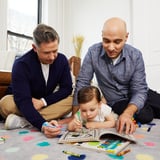My Kid Keeps Asking About LGBTQ+ Couples When We’re in Public. Now What?

If there's one thing we can say about kids universally, it's that they're curious as all get out. Whether they're asking you embarrassing questions in the grocery store parking lot or they're pestering you about where babies come from, answering tough questions is an inescapable aspect of parenting. Given your little ones' natural instinct to get answers to their burning questions, it wouldn't be unusual for them to ask about different types of relationships.
.
While some families have a mom and a dad, there are many that don't. We tapped Shawnese Givens, a family and marriage therapist who splits her time between New York City and Philadelphia, PA, to help us answer questions about same-sex couples, gender identity, and relationships.
What if my child asks about an LGBTQ+ couple when we're out in public?
Being as straightforward with kids as possible starting at a young age about various types of relationships is usually parents' best bet. And just because they might not have an LGBTQ+ couple in their immediate or extended family doesn't mean they can't grasp the dynamic.
"Children are learning about the world from us," Shawnese told POPSUGAR. "So when we normalize and affirm that all relationships are valid relationships, they follow our cues. So say things like, 'Yep, those two people are a couple. They're a couple just like Mommy and Daddy are a couple.' Most kids are going to say OK and move on to the next thing."
What If My Kid Questions Their Own Sexual Orientation or Gender Identity?
While some parents tend to brush off their little kid's feelings, it's quite possible your child will know who they are and to whom they're attracted to from a young age. Sure, that can certainly change over time, but it's important to take these conversations about sexuality and identity seriously.
"It's absolutely possible for a young child to know who they are and who they're drawn to at a young age," said Shawnese. "Certainly, I think that sometimes those things change, right? Some people are of the opinion that kids couldn't possibly know who they are now and will be forever at [age] 5."
As for young children telling you they want to be male even though they're biologically female or vice versa? Keep the conversation casual in the beginning. "I think what's important is to make space for the possibility," she explained. "There's not going to be any harm done by saying, 'Oh, OK, tell me more about that,' and just making room for that conversation. And if your child's feelings eventually change, say, 'Oh, OK, thank you for letting me know.' That's the most supportive way that you can parent a child who's letting you know that they may be a different gender than what they were assigned at birth."
How do I deal with relatives who downplay LGBTQ+ relationships?
Dealing with someone who is willing to downplay LGBTQ+ relationships can be tricky, but the conversation is absolutely necessary if there's a child involved. For example, if you're at a family dinner with your daughter and she asks whether or not her cousin Samantha lives with her partner Tara, be honest. And if someone tries to drop the "Oh, they're just friends" card, kindly correct them.
"In this situation I'd say, 'Oh, actually, they're dating,'" advised Shawnese. "It's a teaching moment for both the child and the other person involved. I would want to be very gentle - and again - normalize that they are dating just like some people are girlfriend and boyfriend. There's also nothing wrong with saying, 'Oh, actually, I think you've got that wrong. Let me just clarify that for you.'"
As for people who are part of the LGBTQ+ community? Feel free to obviously tackle the issue head-on, especially if you're in earshot of the comment. "Say something like, 'I actually want to circle back to this and let you know that we don't see any reason to hide who we are from the children,'" said Shawnese. "'We think it's perfectly normal and natural to be in all kinds of relationships, and we want them to see that. So just so you know, going forward, that's what we're going to be doing.' And if there are feelings to be talked about there, then you can do that."
What do I say to my child if they encounter people who make homophobic comments?
"Honestly, I think that it's important to be transparent with children," said Shawnese. "Let them know that there are going to be people in the world who don't think that LGBTQ+ relationships are OK. Give them some tools and ways that to respond if you're not there. Tell them you want them to know that just because some people say that, it doesn't mean it's true."
As for the language to give children in these situations? Shawnese suggests keeping it simple. "You want to work with your child to find something to say, but it's not like they have to memorize it," she explained. "It's the idea you want to help them with the wording rather than giving them the exact wording."
If you're a parent in the LGBTQ+ community, Shawnese recommends having your child say, "My parents are just as good as anybody else's parents and what you're saying isn't true." It's even OK for children to set boundaries and say, "I don't want to hear you saying things like that about my parents. If you want to talk about that more, you can speak to my mom about that."
